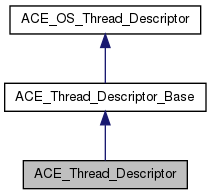|
ACE 6.0.5
|
|
ACE 6.0.5
|
Information for controlling threads that run under the control of the <Thread_Manager>. More...
#include <Thread_Manager.h>


Public Member Functions | |
| ACE_Thread_Descriptor (void) | |
| ACE_thread_t | self (void) const |
| Unique thread id. | |
| void | self (ACE_hthread_t &) |
| Unique handle to thread (used by Win32 and AIX). | |
| void | dump (void) const |
| Dump the state of an object. | |
| void | log_msg_cleanup (ACE_Log_Msg *log_msg) |
| int | at_exit (ACE_At_Thread_Exit *cleanup) |
| int | at_exit (ACE_At_Thread_Exit &cleanup) |
| int | at_exit (void *object, ACE_CLEANUP_FUNC cleanup_hook, void *param) |
| ~ACE_Thread_Descriptor (void) | |
| Do nothing destructor to keep some compilers happy. | |
| void | acquire_release (void) |
| void | acquire (void) |
| void | release (void) |
| void | set_next (ACE_Thread_Descriptor *td) |
| ACE_Thread_Descriptor * | get_next (void) const |
Private Member Functions | |
| void | reset (ACE_Thread_Manager *tm) |
| Reset this thread descriptor. | |
| void | at_pop (int apply=1) |
| void | at_push (ACE_At_Thread_Exit *cleanup, bool is_owner=false) |
| void | do_at_exit (void) |
| Run the AT_Thread_Exit hooks. | |
| void | terminate (void) |
| Terminate realize the cleanup process to thread termination. | |
Private Attributes | |
| ACE_Log_Msg * | log_msg_ |
| ACE_At_Thread_Exit * | at_exit_list_ |
| The AT_Thread_Exit list. | |
| ACE_Thread_Manager * | tm_ |
| ACE_DEFAULT_THREAD_MANAGER_LOCK * | sync_ |
| Registration lock to prevent premature removal of thread descriptor. | |
| bool | terminated_ |
| Keep track of termination status. | |
Friends | |
| class | ACE_At_Thread_Exit |
| class | ACE_Thread_Manager |
| class | ACE_Double_Linked_List< ACE_Thread_Descriptor > |
| class | ACE_Double_Linked_List_Iterator< ACE_Thread_Descriptor > |
Information for controlling threads that run under the control of the <Thread_Manager>.
| ACE_Thread_Descriptor::ACE_Thread_Descriptor | ( | void | ) |
| ACE_Thread_Descriptor::~ACE_Thread_Descriptor | ( | void | ) |
Do nothing destructor to keep some compilers happy.
| void ACE_Thread_Descriptor::acquire | ( | void | ) |
| void ACE_Thread_Descriptor::acquire_release | ( | void | ) |
Do nothing but to acquire the thread descriptor's lock and release. This will first check if the thread is registered or not. If it is already registered, there's no need to reacquire the lock again. This is used mainly to get newly spawned thread in synch with thread manager and prevent it from accessing its thread descriptor before it gets fully built. This function is only called from ACE_Log_Msg::thr_desc.
| int ACE_Thread_Descriptor::at_exit | ( | ACE_At_Thread_Exit * | cleanup | ) |
Register an At_Thread_Exit hook and the ownership is acquire by Thread_Descriptor, this is the usual case when the AT is dynamically allocated.
| int ACE_Thread_Descriptor::at_exit | ( | ACE_At_Thread_Exit & | cleanup | ) |
Register an At_Thread_Exit hook and the ownership is retained for the caller. Normally used when the at_exit hook is created in stack.
| int ACE_Thread_Descriptor::at_exit | ( | void * | object, |
| ACE_CLEANUP_FUNC | cleanup_hook, | ||
| void * | param | ||
| ) |
Register an object (or array) for cleanup at thread termination. "cleanup_hook" points to a (global, or static member) function that is called for the object or array when it to be destroyed. It may perform any necessary cleanup specific for that object or its class. "param" is passed as the second parameter to the "cleanup_hook" function; the first parameter is the object (or array) to be destroyed. Returns 0 on success, non-zero on failure: -1 if virtual memory is exhausted or 1 if the object (or arrayt) had already been registered.
| void ACE_Thread_Descriptor::at_pop | ( | int | apply = 1 | ) | [private] |
Pop an At_Thread_Exit from at thread termination list, apply the at if apply is true.
| void ACE_Thread_Descriptor::at_push | ( | ACE_At_Thread_Exit * | cleanup, |
| bool | is_owner = false |
||
| ) | [private] |
Push an At_Thread_Exit to at thread termination list and set the ownership of at.
| void ACE_Thread_Descriptor::do_at_exit | ( | void | ) | [private] |
Run the AT_Thread_Exit hooks.
| void ACE_Thread_Descriptor::dump | ( | void | ) | const |
Dump the state of an object.
| ACE_Thread_Descriptor * ACE_Thread_Descriptor::get_next | ( | void | ) | const [inline] |
| void ACE_Thread_Descriptor::log_msg_cleanup | ( | ACE_Log_Msg * | log_msg | ) | [inline] |
This cleanup function must be called only for ACE_TSS_cleanup. The ACE_TSS_cleanup delegate Log_Msg instance destruction when Log_Msg cleanup is called before terminate.
| void ACE_Thread_Descriptor::release | ( | void | ) |
| void ACE_Thread_Descriptor::reset | ( | ACE_Thread_Manager * | tm | ) | [inline, private] |
Reset this thread descriptor.
| void ACE_Thread_Descriptor::self | ( | ACE_hthread_t & | handle | ) | [inline] |
Unique handle to thread (used by Win32 and AIX).
| ACE_thread_t ACE_Thread_Descriptor::self | ( | void | ) | const [inline] |
Unique thread id.
| void ACE_Thread_Descriptor::set_next | ( | ACE_Thread_Descriptor * | td | ) | [inline] |
Set/get the next_ pointer. These are required by the ACE_Free_List.
| void ACE_Thread_Descriptor::terminate | ( | void | ) | [private] |
Terminate realize the cleanup process to thread termination.
friend class ACE_At_Thread_Exit [friend] |
friend class ACE_Double_Linked_List< ACE_Thread_Descriptor > [friend] |
Reimplemented from ACE_Thread_Descriptor_Base.
friend class ACE_Double_Linked_List_Iterator< ACE_Thread_Descriptor > [friend] |
Reimplemented from ACE_Thread_Descriptor_Base.
friend class ACE_Thread_Manager [friend] |
Reimplemented from ACE_Thread_Descriptor_Base.
The AT_Thread_Exit list.
ACE_Log_Msg* ACE_Thread_Descriptor::log_msg_ [private] |
Thread_Descriptor is the ownership of ACE_Log_Msg if log_msg_!=0 This can occur because ACE_TSS_cleanup was executed before terminate.
ACE_DEFAULT_THREAD_MANAGER_LOCK* ACE_Thread_Descriptor::sync_ [private] |
Registration lock to prevent premature removal of thread descriptor.
bool ACE_Thread_Descriptor::terminated_ [private] |
Keep track of termination status.
ACE_Thread_Manager* ACE_Thread_Descriptor::tm_ [private] |
Pointer to an ACE_Thread_Manager or NULL if there's no ACE_Thread_Manager>
 1.7.4
1.7.4